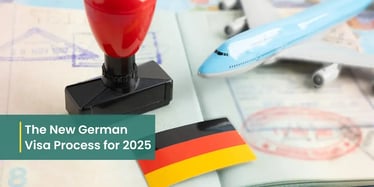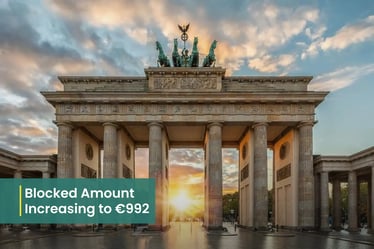Different German Residence Permits

Contents
Germany is a popular destination for immigrants due to its strong economy and high standard of living. If you are looking to move to Germany, in many cases, you will need to obtain a residence permit. Getting a residence permit can be challenging, so it is essential to start planning well in advance.
All about Permanent Residency (PR) in Germany
There are many different temporary residency permit types, as well as the German permanent residency permit available in Germany. Each of these have their own requirements.
A German permanent residence permit, sometimes called a settlement permit, can be issued to non-EU citizens who have lived in Germany for five years or more. One of the major benefits of having such a residence title is that it allows free movement within the Eurozone and does not require any renewal, i.e. it is an open-ended residency permit.
But don't get confused; this is not the same as becoming a German Citizen (naturalization).
Read on for an overview of the different types of permits available in Germany, the application process, and the requirements. We will also provide a timeline for when you can expect to receive your permit.
Types of German Residence Permits
Several types of residence permits (Aufenthaltstitel) are available in Germany, each with its own set of requirements.
The most common types of residence permits are:
- Student residence permit (Aufenthaltserlaubnis zum Studium): This type of temporary residence permit is for foreigners enrolled in a school or university in Germany. To be eligible for this permit, you must provide proof of your university enrollment and financial resources during your stay in Germany. The student residence permit allows you to stay in Germany during your studies and comes with a few regulations on working hours if you wish to pursue a student job.
- Job seeker's permit: If you are looking for a job in Germany, you may be eligible for a job seeker's permit. This permit allows you to stay in Germany for 18 months until you land a job in your field. To qualify for this permit, you must provide proof of your job search and financial resources. This type of permit is also the one you will get if you decide to stay in Germany after your studies but haven’t found a job by the time you graduate.
- Employment residence permit (Arbeitserlaubnis): This residence permit is for foreigners who have a job offer to work in Germany. This permit allows you to stay in Germany and work for the sponsoring company, depending on the contract term. To be eligible for this permit, you must have a valid work visa and show proof of your job contract.
- Residence permit for family reunification (Familiennachzug): This type of residence permit is for foreigners who have family members already living in Germany. The family members must be able to provide proof of their relationship with you and guarantee that they can support you financially.
- Permanent residence permit (Niederlassungserlaubnis): This type of residence permit is for foreigners who have lived in Germany for a specific time and meet certain requirements. To be eligible for this permit, you must have lived in Germany for at least five years (or three years if you are married to a German citizen). You must also be able to provide proof of your employment, financial resources, and German language skills. If you have this permit, you can stay in Germany indefinitely. International students who have graduated from a German university can also secure permanent residency after two years of holding a work-related permit.
- EU Blue card: The EU Blue Card is a residence permit valid for up to four years. It is for foreigners who have a job offer in Germany and meet specific requirements. To be eligible for this permit, you must have a valid work visa, prove that you have the financial resources to support yourself and meet specific language requirements.
Find Out How to Apply for a Student Residence Permit in Germany.

What is a Permanent Residence Permit?
A PR permit allows individuals to stay in Germany for an unspecified period. Although it's not the same as getting German citizenship and having a German passport, permanent residency does offer much more security than having a temporary residence permit (Aufenthaltserlaubnis).
In some instances, it is possible to gain German permanent residency in just two years. This applies to those who have graduated from a German university and then lived and worked in Germany for two years. Individuals married to German citizens may be able to apply for PR permits for themselves and their family members after three years. The other way to be fast-tracked is if you are a highly skilled professional in a so-called bottleneck occupation and, therefore, a highly sought-after worker in Germany.
Additionally, if you have lived in an EU country for 5 or more years, there is also the option to apply for the EC long-term residence permit, also known as an EU Residence Permit.
Permit Exclusions
If you are from the EU or EEA, you do not need to apply for a residence permit because you already have the right to live and work in Germany. Due to Brexit, UK individuals may need a residence permit. This will depend on when you first moved to Germany.
How do I become a resident of Germany?
You are technically already a resident of Germany if you have any long-stay visa or temporary/current residence permit. But, if you want to become a permanent resident of Germany, then you need to apply for a permanent residence permit.
These are only issued after living in Germany for a period of more than five years, and you must have had a temporary residence permit or visa for that length of time. You will need to have basic knowledge of the legal and social system and the German language, as well as an understanding of the way of life in Germany as a whole.
Can you travel with a German Residence Permit?
A German residence permit allows you to travel freely within the Schengen Area, which consists of 26 European countries that have abolished border controls at their mutual borders. You can stay in other Schengen countries for up to 90 days within any 180-day period without needing additional visas.
What happens if you overstay your visa in Germany?
Visas are granted for a range of time periods, often dependent on the length of a study period or a job contract. It’s really important not to overstay the time granted on your visa. Overstaying on a visa is a legal offense, renders you an illegal immigrant, and could result in deportation.
Requirements for a Permanent Residence Permit
Is it easy to get permanent residence in Germany?
If you meet all the necessary criteria, have all the required documents, and successfully sit the interview, then yes, it can be easy to gain a permanent residence permit and permanent residency status.
PR requirements in Germany
This is a list of all required documents needed to apply for a permanent settlement permit and the local Foreigners' Office:
- Completed application form (Antrag auf Erteilung der Niederlassungserlaubnis)
- Proof of current and paid health insurance (at least 60 months of social security contributions)
- Valid passport
- Recognized certificate of knowledge of the German language (at least B1 German language level)
- 1 x biometric photo
- Certificate of German university degree (if applying for a fast-tracked permanent residence permit as a graduate of a German university)
- Marriage certificate (if applying for a fast-tracked permanent residence permit as a result of being married to a German citizen)
- Proof of being financially secure (bank statements for employed individuals and tax returns for self-employed)
- A letter from your employer/or university
- Proof of accommodation and registration (Anmeldungsbestätigung)
- Professional license (if applying for a fast-tracked permanent residence permit as a result of being highly skilled in a field)
German bureaucratic system
It’s important to remember that the German bureaucratic system is fairly strict and any holes or gaps in your application will result in you either not being granted the residence permit in Germany or cause a long delay to your application.
Germany PR: How to apply for a German Residence Permit
To successfully navigate the application process, there are several steps. First, get the correct form (Antrag auf Erteilung einer Niederlassungserlaubnis) from the immigration office and make an appointment. Then, ensure all your documents (listed above) are in order.
Bring the completed form and all the above documents to your appointment. During your interview, your documents will be checked, and you may be asked questions about why you are applying.
German law
You may be briefly tested as to your knowledge of German law, politics and society in this appointment, so make sure to prepare as if this will happen to avoid disappointment.
How long does it take to get a Residence Permit in Germany?
From the time of your interview, provided your documents are completely in order, it will usually take around 2-3 weeks for your permanent residence Permit to be processed.
How much is a German Residence Permit?
The cost of a German residence permit can vary depending on several factors, such as the type of permit and the applicant's specific circumstances. Usually, it costs between €135 and €200.
Dual citizenship in Germany
Some individuals choose to progress from being a residence permit holder and apply to be a German Citizen with a German passport. Unlike nations that prohibit dual citizenship, it has long been possible to have dual citizenship in Germany, provided the other country also allows dual citizenship.
While it is allowed, individuals aren’t actively encouraged to have two passports. However, for EU nationals naturalized in Germany, dual citizenship is common. It is also permitted for refugees from countries where it is not possible to renounce citizenship. Countries that do not allow dual citizenship include China, Japan, and India. Individuals from those countries wishing to become naturalized Germans will need to give up their citizenship’s rights or their home country.
In order to apply for dual citizenship, you need to follow the process for how to become a German citizen. This usually requires having a permanent residence permit for at least 8 years.
EU Blue Card for Germany
The EU Blue Card is a relatively new type of residency permit, which permits non-EU workers to gain residency without a visa. It is issued for the purpose of highly qualified employment. According to the Residence Act, you are considered a skilled worker if you have for example have successfully completed qualified vocational education and training in Germany or have a German university degree, a recognized foreign university degree or a foreign university degree comparable to a German degree.
It is aimed at highly skilled workers. The Requirements for an EU Blue card are significant, and it’s certainly not a quick or easy solution to residency. For a start, individuals who would like to become EU Blue Card holders must have a university degree.
The initial terms of the Blue Card will normally permit you as a Blue Card holder to stay for up to four years unless the work contract is shorter than this. There is, then, the option to apply for permanent residence status after that time. Once you have been granted an EU Blue Card, you can move to another EU country after a period of 18 months of living in Germany. In this case, you must then apply for a new EU Blue Card in the country you are moving to.
Naturalization
Naturalization is the process by which a foreign national is granted German Citizenship. The method of applying for naturalization can be complicated. You will need to provide a range of documents, including evidence of your language skills and knowledge of the legal system. You will also need to pass a naturalization test and have not committed any crime or criminal offense.
To be eligible for naturalization, you must have:
- Lived in Germany for eight years with a residence permit.
- You can live independently and support yourself and your family without relying on social security benefits or employment insurance.
- You have the right to reside in Germany as long as you want.
You can find more information about naturalization on the Federal Office for Migration and Refugees (BAMF) website.
The Application process for naturalization
The application for naturalization is a two-stage process. The first stage is submitting the application form and required documents to the responsible naturalization authorities. If you are under 16 years of age, a parent or guardian must apply on your behalf.
The fee for applying for naturalization is €255.00. The fee for naturalizing children with their parents is €51 per child. In the case of low-income or a large number of children to be naturalized simultaneously, these fees may be reduced or waived by authorities.
After submitting your application, the authorities will review your documents and decide whether to grant you an interview. The interview is the second stage of the application process. During the interview, you will be asked questions about your motivation for applying for German Citizenship and your knowledge of the German language, culture, and society. You will also be asked to take a German language test (if you have not already done so) and a naturalization test.
After completing both stages, you will be granted German Citizenship. You will then receive a certificate of naturalization (Einbürgerungszusicherung), and you can apply for a German passport or ID card.
Benefits: Work in Germany without restrictions and more
Any legal employment is permitted. It is also unlimited in time and place. This means that with a valid PR permit, you can freely choose your occupation, such as self-employment. A big advantage is that this permit is not tied to a specific job! This means you can change your job without having to notify the Federal Office or the Federal Employment Agency. In addition, you do not have to apply for an extension of your residence permit every few years.
Better credit rating
Another advantage of the unrestricted residence permit in Germany that should not be neglected becomes apparent when taking out a loan. If you only have a temporary right of residence in Germany, it is very hard to find a bank that will grant you a loan. It can be too uncertain if you can really repay the loan. An unlimited settlement permit entitles you to permanent residency in Germany and significantly increases your chances of obtaining a loan from the bank.
Travel permit
Permanent residency in Germany gives you complete freedom of movement. This means that you can not only travel within Germany without restrictions but also leave and return without any problems. The only important thing is that you are not allowed to leave the country for longer than 6 months or with the intention to emigrate. Upon application, you may even leave Germany for longer than 6 months. This has the particular advantage that you can travel to your country of origin at any time without losing your Residence Permit in Germany.
EU permanent residence permit
This unlimited residency permit goes beyond a temporary settlement permit. In addition to permanent living and working in Germany, a longer stay in other EU countries is also possible. Depending on the country, there is also a work permit. If this residence title was acquired in Germany, it expires for Germany, for example, only after one has resided in another EU country for 6 years.
Guaranteed social security
German permanent residents are entitled to social security and health insurance. This means that they have access to social benefits, such as childcare benefits, health benefits, and social assistance, if they lose their jobs or are made redundant.
Become a German national with a PR
Becoming a German national is more than just acquiring a passport. It's about embracing a new home, culture, and way of life. As you walk the streets of historic cities, engage with the vibrant culture, and participate in the democratic process, you begin to weave yourself into the fabric of German society. It’s a journey that transforms your identity, providing a sense of belonging and stability. From the robust social benefits to the freedom to travel and work across the EU, German citizenship opens doors to new opportunities and experiences, making every step of the naturalization process worthwhile.
This might also be of interest to you

Getting a German Visa in 2025 Just Got Easier – Here’s What’s New!
If you’re planning to move to Germany for studies or work, we’ve got great news for you! The German visa process is becoming much simpler and faster...

German Student Visa
A German Student Visa is necessary for many international students who are coming from non-EU or non-EEA countries to study in Germany.

German Language Course Visa
Many students undertaking a German language course in Germany will need a specific Student Language Course Visa. This visa is necessary for non-EU...

Visa Rejection Germany
Are you dreaming of sipping coffee in a cozy café and starting a new chapter working in Germany? Before you pack your bags, there's one major hurdle...

Funding your German Blocked Account in 2025: How much money do you need?
Opening and funding your Blocked Account is one of the first steps to secure your German visa. In 2025, the standard amount you need to prove to the...

Different German Residence Permits
Germany is a popular destination for immigrants due to its strong economy and high standard of living. If you are looking to move to Germany, in many...

German Visa Application Process for International Students
International students from all over the world choose Germany as a place to further their education. The country has some of the best universities in...




